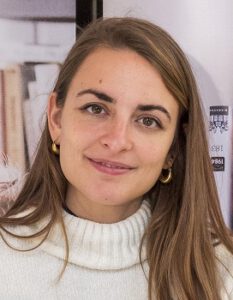De Spaanse schrijfster en kunstenares Irene Solà Sáez werd geboren op 17 augustus 1990 in Malla, Catalonië. Zij heeft een graad in beeldende kunst van de Universiteit van Barcelona en een master in literatuur, film en visuele cultuur van de Universiteit van Sussex. Haar eerste dichtbundel, “Bèstia” uit 2012, werd bekroond met de Amadeu Oller Poëzie Prijs en is vertaald in het Engels als Beast”. Haar eerste roman, “Els dics” (The Dams, L’Altra Editorial, 2018), won de Documenta-prijs en kreeg een beurs voor literaire creatie van het Catalaanse ministerie van Cultuur. In 2018 was ze resident writer bij het Alan Cheuse International Writers Center van de George Mason University (Virginia, Verenigde Staten) en eind 2019 werd ze geselecteerd om deel te nemen aan het Art Omi: Writers Ledig House-programma (New York). In 2019 ontving ze de Premi Llibres Anagrama de Novel·la voor “Canto jo i la muntanya balla” (Als ik zing, dansen de bergen). Datzelfde jaar ontving ze ook de Núvol-prijs en de Cálamo-prijs voor de Spaanse editie van het boek. In 2020 won ze de European Union Prize for Literature en de Maria Àngels Anglada-prijs. In 2022 werd het boek ook genomineerd voor de Warwick Prize for Women in Translation. In 2023 werd het boek genomineerd voor de Oxford-Weidenfeld Translation Prize. Irene Solà Sáez heeft haar werk tentoongesteld in het CCCB in Barcelona en de Whitechapel Gallery in Londen.
Uit: When I Sing, Mountains Dance (Vertaald door Mara Faye Lethem)
“We arrived with full bellies. Painfully full. Black bellies, burdened with cold, dark water, lightning bolts, and thunderclaps. We came from the sea and from other mountains, and from un-thinkable places, and we’d seen unthinkable things. We scratched at the rock atop the peaks, as if we bore salt, to ensure not even weeds would sprout there. We chose the color of the hills and the fields, and the gleams in rivers, and the glints in upward-glancing eyes. When the wild beasts caught sight of us, they cowered deep in their caves and crimped their necks, lifting their snouts to catch the scent of damp earth approaching. We covered them all like a blanket. The oak and the boxwood and the birch and the fir. Shhhhhhh. And they all went silent, because we were a stern roof and it was up to us to decide who would have the tranquillity and joy of a dry soul. After our arrival all was stillness and pressure, and we forced the thin air down to bedrock, then let loose the first thunderclap. Bang! A reprieve. And the coiled snails shuddered in their secluded homes, godless and without a prayer, knowing that if they didn’t drown, they would emerge redeemed to breathe the dampness in. And then we poured water out in colossal drops like coins onto the earth and the grass and the stones, and the mighty thunderclap resounded inside the chest cavity of every beast. And that was when the man said damn and blast. He said it aloud, because when a man is alone there’s no need to think in silence. Damn and blast, you had to get yourself stuck in a storm. And we laughed, huh, huh, huh, huh, as we dampened his head, and our water slunk into his collar, and slid down his shoulder and the small of h is back. Our droplets were cold and made him cross. The man came from a house not far off, halfway up to the crest, by a river that must have been cold because it hid beneath the trees. There he’d left behind two cows, a bunch of pigs and hens, a dog and two roving cats, an old man, and a wife and two kids. Domenec was the man’s name. And he had a lush midmountain garden patch and some poorly plowed fields beside the river. The patch was tended by the old man—his father, whose back was flat as a board—and Domenec plowed the fields. Domenec had come to reel off his verses over on this side of the mountain. To see what flavor and what sound they had, because when a man is alone there’s no need to whisper. That evening when he checked on the herd he found a fistful of early black chanterelles, and he carried the mushrooms wrapped in the belly of his shirt. The baby cried when he left the house, and his wife said -Domenec” as if protesting, as if pleading, and Domenec went out anyway.”

Irene Solà (Malla, 17 augustus 1990)
